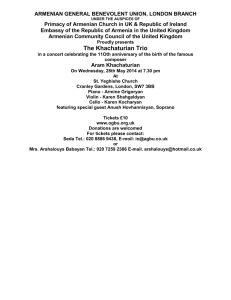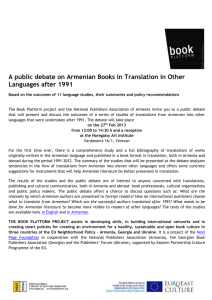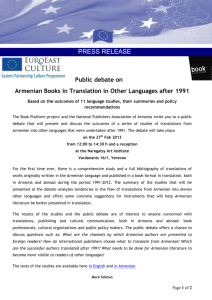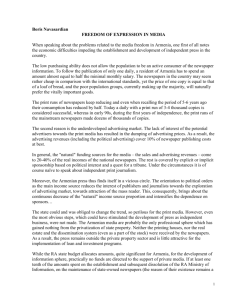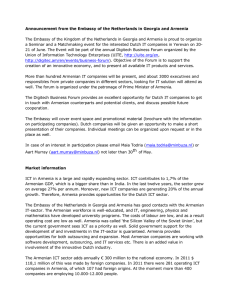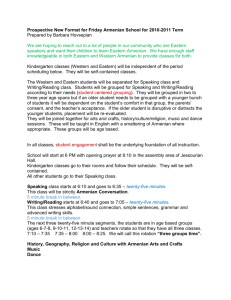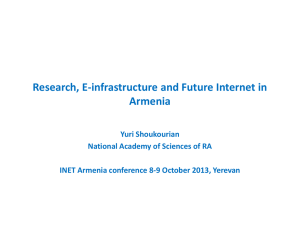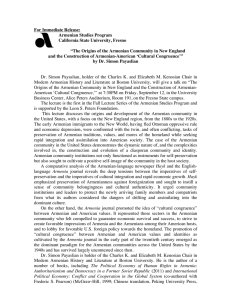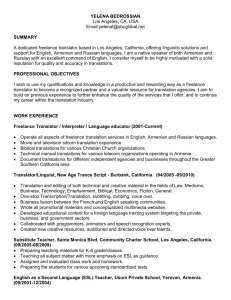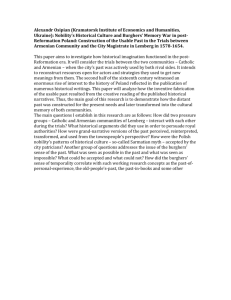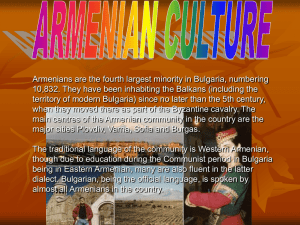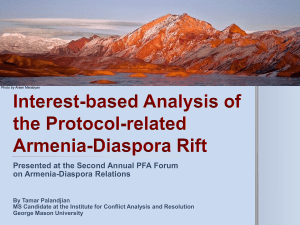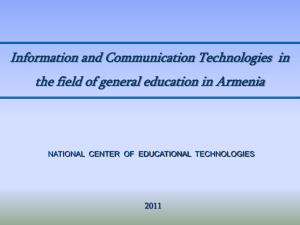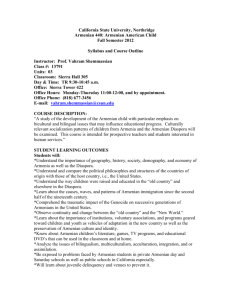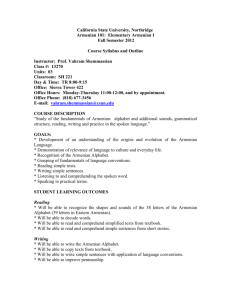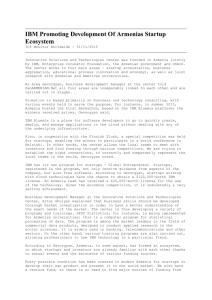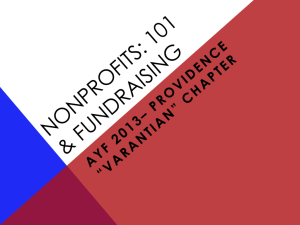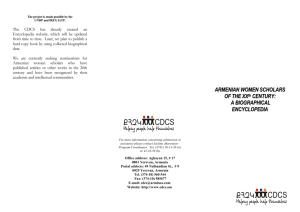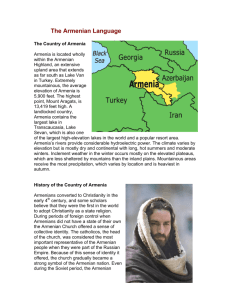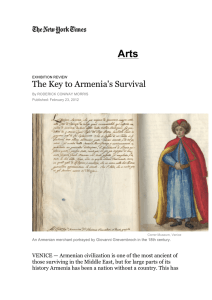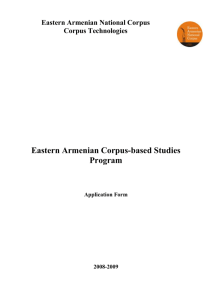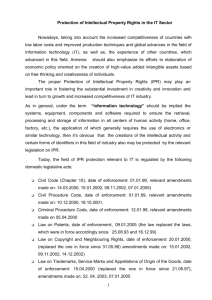ARMN 310 - California State University, Northridge
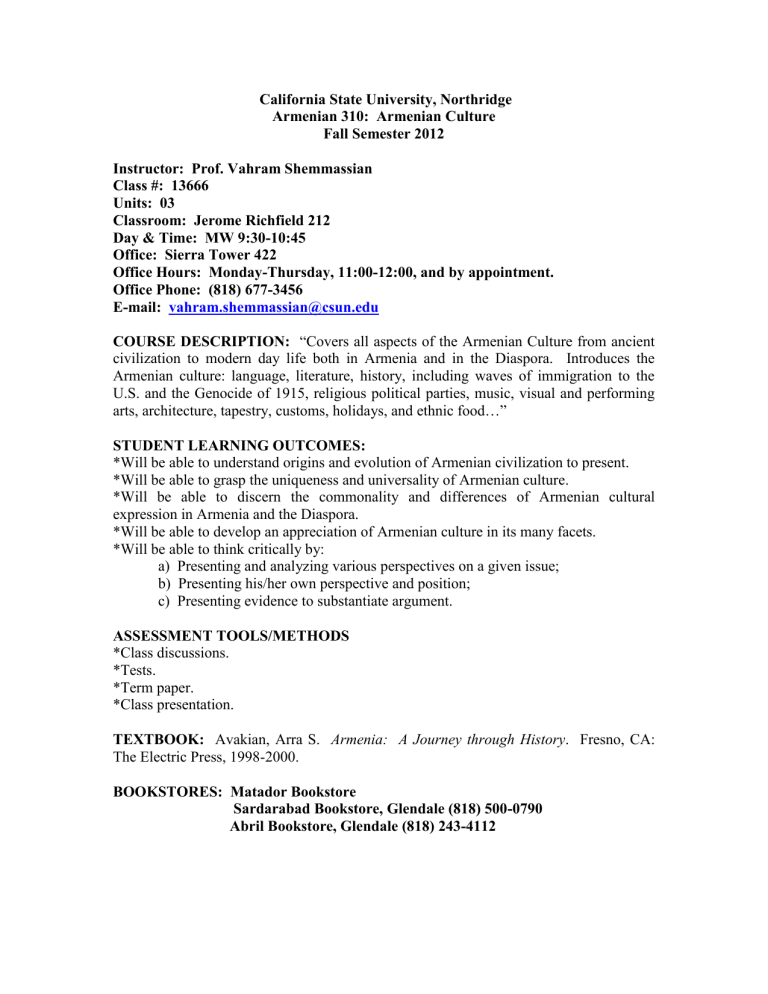
California State University, Northridge
Armenian 310: Armenian Culture
Fall Semester 2012
Instructor: Prof. Vahram Shemmassian
Class #: 13666
Units: 03
Classroom: Jerome Richfield 212
Day & Time: MW 9:30-10:45
Office: Sierra Tower 422
Office Hours: Monday-Thursday, 11:00-12:00, and by appointment.
Office Phone: (818) 677-3456
E-mail: vahram.shemmassian@csun.edu
COURSE DESCRIPTION:
“Covers all aspects of the Armenian Culture from ancient civilization to modern day life both in Armenia and in the Diaspora. Introduces the
Armenian culture: language, literature, history, including waves of immigration to the
U.S. and the Genocide of 1915, religious political parties, music, visual and performing arts, architecture, tapestry, customs, holidays, and ethnic food…”
STUDENT LEARNING OUTCOMES:
*Will be able to understand origins and evolution of Armenian civilization to present.
*Will be able to grasp the uniqueness and universality of Armenian culture.
*Will be able to discern the commonality and differences of Armenian cultural expression in Armenia and the Diaspora.
*Will be able to develop an appreciation of Armenian culture in its many facets.
*Will be able to think critically by: a) Presenting and analyzing various perspectives on a given issue; b) Presenting his/her own perspective and position; c) Presenting evidence to substantiate argument.
ASSESSMENT TOOLS/METHODS
*Class discussions.
*Tests.
*Term paper.
*Class presentation.
TEXTBOOK: Avakian, Arra S. Armenia: A Journey through History . Fresno, CA:
The Electric Press, 1998-2000.
BOOKSTORES: Matador Bookstore
Sardarabad Bookstore, Glendale (818) 500-0790
Abril Bookstore, Glendale (818) 243-4112
EVALUATION METHOD:
1.
Test 1: 30%
2.
Test 2: 30%
3.
Paper: 30%
The term paper must be 5-6 typewritten pages, double space. Use the MLA system for references. Title page is not counted as a page. Bibliography must include at least three sources. One full grade will be deducted for late submissions. Plagiarism will not be tolerated.
4.
Class presentation: 10%
GRADING SCALE:
A = 95-100
A- = 90-94
B+ = 87-89
B = 84-86
B- = 80-83
C+ = 77-79
C = 74-76
C- = 70-73
D+ = 67-69
D = 64-66
D- = 60-63
F = 59 and below
ATTENDANCE : Students are required to attend each and every session and to be on time. One full semester grade will be lowered for three unexcused absences .
CONDUCT AND WORK ETHICS: Please refer to the 2012-2014 CSUN Catalog, pp.
646-648. NO TEXTING ALLOWED IN CLASS.
COURSE OUTLINE:
Week 1, August 27 & 29: Introduction, syllabus/course outline, paper; survey of
Armenian history and geography. Pp. 3-88.
Week 2, September 3 (Labor Day, no class) & 5: The Armenian Apostolic, Catholic, and Evangelical Churches; Major holidays and traditions; Sharagan s (religious chants);
Khachkar s (stone crosses); Illuminated manuscripts; Architecture. Pp. 101-119; 139-
140; 185-188; 241-246; 257-258.
Week 3, September 10 & 12: Language and Literature: History of the Armenian language; the Renaissance; Twentieth Century. Pp. 171-182; 191-196.
Week 4, September 17 & 19: Ethnic food, symbols, and rituals. September 19: Test 1.
Week 5, September 24 & 26: Education: Survey from earliest times; Soviet Armenia;
Modern Armenia; the Diaspora; USA/California. Paper topics with bibliography are due on September 26.
Week 6, October 1 & 3: The periodical press: Survey since 1794; the 19 th
Century;
Soviet Armenia; Modern Armenia; the Diaspora; USA/California.
Week 7, October 8 & 10: Music: Various genres; famous composers and musicians.
Pp. 199-200; 259-272.
Week 8, October 15 & 17: Painting: Evolution and famous painters. Pp. 273-280.
October 17: Test 2.
Week 9, October 22 & 24: Folk Art: Wood, Clay, and Jewelry; Wedding traditions.
Pp. 93-98; 291-294; 297-300.
Week 10, October 29 & 31: Carpets: Origins, types and symbols; needle work; textiles.
Pp. 295-296.
Week 11, November 5 & 7: Film: History and masterpieces; famous personalities. Pp.
287-293. Papers are due on November 7.
Week 12, November 12 (Veterans’ Day, no class) & 14: Theater: History and famous playwrights.
Week 13, November 19 & 21: Impact of the Genocide on Culture.
Week 14, November 26 & 28: Oral presentations.
Week 15, December 3 & 5: Oral presentations.
Week 16, December 10: Oral presentations.
